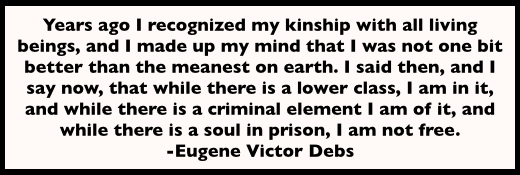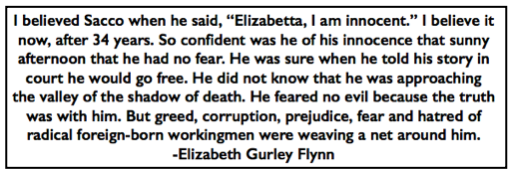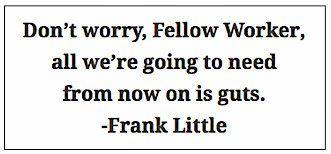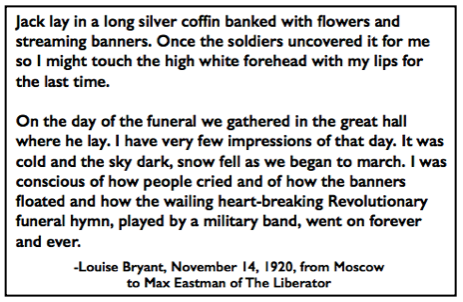
—————
Hellraisers Journal – Monday January 10, 1921
“Eugene” By Edmund Vance Cooke
(Written in the courtroom while Debs was being tried.)
From the Appeal to Reason of January 8, 1921:

—————
Hellraisers Journal – Monday January 10, 1921
“Eugene” By Edmund Vance Cooke
(Written in the courtroom while Debs was being tried.)
From the Appeal to Reason of January 8, 1921:
 ———-
———-
Hellraisers Journal – Wednesday January 5, 1921
Dedham, Massachusetts – A Visit with Nicola Sacco, Gallant Fighter
From The World Tomorrow of January 1921:
Sacco and Vanzetti
By MARY HEATON VORSE
WE drove through the sweet New England towns on our way to the jail in Dedham , where Nicola Sacco has been sitting for six months , deprived of all occupation, waiting his trial.
He is accused of having killed two men on April 15th and having made off in an automobile with $ 18,000 from the pay roll of the Slater and Morrill Shoe Plant in South Braintree. Labor is again on trial in Massachusetts.
Bartolomeo Vanzetti is also accused of this crime. But he is not in Dedham Jail because he has already begun serving a fifteen year sentence in Charlestown. On December 24th, 1919 , there was an attempted hold-up in Bridgewater of another shoe company. No arrests were made-not until May 5th, 1920. There were eighteen people who swore an alibi for Vanzetti. Eighteen people testified that on the afternoon and evening of December 24th Vanzetti was selling eels in Plymouth, for eels on Christmas Eve are to Italians what turkeys are to us on Thanksgiving. These witnesses knew Vanzetti very well, for he was a fish peddler in Oldtown, where they lived. But the testimony of these eighteen people did not count with the American jury. There were three people who identified Vanzetti as the man whom they had seen six months before driving in an automobile, from which shots were fired in Bridgewater. One of the women who identified Vanzetti was blind in one eye. But their identification convicted him.
As for Sacco, not one of the people brought in to identify him swear that this was the man they saw shooting, yet he is held without bail.
But Sacco and Vanzetti are offenders of another sort than criminal offenders. They have both taken an active part as labor leaders among the Italians. Not only were they gallant fighters, both of them, but they were inconveniently holding meetings about Salsedo– Salsedo, who went crazy—maybe—and on May 1st jumped from the fourteenth floor window of the Post Office Building in New York City, where he had been illegally detained by the Department of Justice agents for months—the only man who died in Mr. Palmer’s great May Day revolution. Among the Italians there is a ghastly suspicion that Salsedo did not jump-anyway, it was mighty inconvenient having young men holding meetings about him.
 ———-
———-
Hellraisers Journal – Sunday January 2, 1921
Chicago, Illinois – Mary Heaton Vorse Has Supper with Convicted Fellow Workers
From The Liberator of January 1921:
Twenty Years
By Mary Heaton Vorse
RECENTLY in Chicago, after a meeting, I went to get a sandwich with a group of labor men. As I looked around the table, it came to me with a shock that I was the only person there, but one, who was not condemned to a long jail sentence. For all the people at the table were members of the Industrial Workers of the World convicted in the famous Chicago case.
Ralph Chaplin sat next to me. I had been talking only a few minutes before with his wife, a girl of extraordinary loveliness. She had not come out with us to supper because she had gone home to put her little boy of seven to bed. I had seen them standing all three together, only a half hour before.
Ralph Chaplin is a gifted idealist, a poet, as well as a man of action. His quality of uncompromising courage made me think of Jack Reed. It is upon such youth that the strength of a people is founded, men ready to suffer and with gifts to make people understand the beliefs which have stirred their hearts. And his wife is like him. It made you feel right with life to see them together. They face a 20-year sentence.
Ralph Chaplin is to be put in jail because he belonged to an industrial union, a legal organization.
Ralph Chaplin was Editor of “Solidarity.” And that is why he was given twenty years. It was a pretty bad crime for anyone to hold a red card. The talented ones were selected for 20-year sentences. Apparently Judge Landis could not bear that a man of attainments and gifts should belong to the organization of the I. W. W.
Charles Ashleigh is another poet. What had he done? He had been an I. W. W. He has a sentence of five years. He was one of those against whose sentence even Captain Lanier of the Military Intelligence protested. One wonders if the Captain had ever read the poem by his distinguished relative, called “Jacquerie.” And so Charles Ashleigh is among those who are slated for Leavenworth, where he has already spent two years.
Opposite me sat George Hardy, the. General Executive Secretary. He was one of those who got off easy. He only got a year and he has already served his sentence. No one knew exactly why some got long sentences or why some got short ones.
Bill Haywood, at the head of the table, as a matter of course was given the maximum sentence; that means a death sentence if it is carried out.
 ———-
———-
Hellraisers Journal – Saturday December 25, 1920
Atlanta Penitentiary – President Wilson Refuses to Release Eugene Debs
From The Atlanta Constitution of December 24, 1920:
NO XMAS PARDON FOR EUGENE DEBS
FROM PRESIDENT
———-
Eugene V. Debs, socialist candidate for president, now serving a ten-year sentence in the Atlanta federal prison, will not be freed from the penitentiary Christmas day, as has been rumored, according to dispatches received from Washington Thursday night.
There has been much talk in Atlanta, centered around the belief among those who will be extended executive clemency by President Wilson on Christmas day, but it is now understood that the president has refused to extend clemency in the socialist leader’s case, believing it not consonant with public interest.
It has also been said that Attorney General A. Mitchell Palmer, whom friends of Debs have been inclined to hold responsible for the president’s continued refusal to cut the prison term short, actually recommended the pardon of Debs some time ago.
———-
[Drawing by Art Young and emphasis added.]
 ———-
———-
Hellraisers Journal – Wednesday December 8, 1920
Max Eastman: “John Reed sacrificed a life to the revolution…”
From The Liberator of December 1920
-“Fog” by John Reed:
———-
JOHN REED
[-from Speech by Max Eastman.]
WE have been reading in the great newspapers of this city the last few days very appreciative accounts of the life and character of John Reed. They have permitted themselves to admire his courage and honesty and the great spirit of humorous adventure that was in him. They permit themselves to admire him in spite of the fact that he died an outlaw and a man wanted by the police as a criminal. They admire him because he is dead. But we speak to a dIfferent purpose. We pay our tribute to John Reed because he was an outlaw. We do not have to examine the indictment, or find out what special poison the hounds of the Attorney-General had on their teeth against John Reed. We know what his crime was-it is the oldest in all the codes of history, the crime of fighting loyalty to the slaves. And we pay our tribute to him now that he lies dead, only exactly as we used to pay it when he stood here making us laugh and feel brave, because he was so full of brave laughter. Our tribute to John Reed is a pledge that the cause he died for shall live.
 ———-
———-
Hellraisers Journal – Monday November 1, 1920
Moscow, Russia – John Reed Died at His Post on October 17th
From The Liberator of November 1920:
 ———-
———-
Hellraisers Journal – Monday August 9, 1920
“The Garland for Debs” -a Poem by Louis Untermeyer
From the New York Liberator of August 1920:
 ———-
———-
Hellraisers Journal – Thursday August 5, 1920
Robert Minor on the Battle at Matewan Between Citizens and Gunthugs
From the New York Liberator of August 1920:
IV of IV
About half past five in the afternoon, Chief Hatfield was standing around when a boy runs in, saying, “The thugs is come to town!”
Sid Hatfield walked out quick to the back street and there was Albert and Lee Felts and C. B. Cunningham, the gunman that was known for being quick on the draw. And standing back of them was ten Baldwin-Felts men. Then there was a dummy that had been hanging around town all day without any gun and not letting on he was a Baldwin-Felts man.
Sid walked up to Albert Felts and says, “I’ve got a warrant for you.”
Albert sort of grinned and says, “I’ll return the compliment; I’ve got a warrant for you.” All of the thugs kind of shuffled around on one foot and then the other, and pretty soon Sid was surrounded. Sid looked around and seen there was no friends near, only Isaac Brewer, the town policeman, was standing quiet.
Albert Felts says to Sid, “We’ll take you up to Bluefield on the train that’s due in seven minutes.” Sid says nothing and just smiles. And Albert says, “We’ll ride on the Pullman, Sid,” and walks Sid over to near the place where the end of the train will stop, and says, “Is this where the Pullman stops?” and Sid said “Yes.”
Sid knew it wasn’t no Pullman ride they planned for him, but that they wanted to be near the end of the train to jump on when they got through with him. The train only stops a minute.
They stood around waiting, and Sid kind of edged back towards the town-side of the street, near the back door of Chambers’ hardware store. Albert Felts and Cunningham the gunman kept close to, Sid, while Lee Felts and the ten other gunmen was standing back a little piece, nearer the railroad track. Albert says again that the train will be in in seven minutes and they would take the Pullman.
 ———-
———-
Hellraisers Journal – Wednesday August 4, 1920
Robert Minor Arrives in Matewan, Meets Smilin’ Sid Hatfield
From the New York Liberator of August 1920:
III of IV
From the five o’clock morning train I alighted at the little. double row of stores and houses that are called Matewan, and before the town was astir I took a walk to the middle of the bridge over Tug River. There boy asked me, “Is it true they got two more thugs up the road last night?” I turned back to talk with the boy, and then I saw a man on a bench before a building on which was scrawled in red letters, “U. M. W. of A.” This man’s face limbered up when I told him I was a friend of Fred Mooney, Secretary of the Mine Workers at Charleston, and he said, “I sized you up as a friend of the Union and I’m glad you didn’t go further across the bridge, because you might have got shot. That is Pike County, over there.”
Toward nine o’clock I saw, standing near the railroad track, a middle-sized man of age about twenty-two. Although this man was alone, he was continually smiling. When he moved, his vest was displaced and exposed two Smith & Wesson revolvers, one stuck into each side of his trousers; A coal digger introduced him as Chief of Police Sid Hatfield.
 ———-
———-
Hellraisers Journal – Tuesday August 3, 1920
Robert Minor Reports on Efforts to Organize Mingo County
From the New York Liberator of August 1920:
II of IV
When the United States entered the World War and the getting-out of coal became important, the United Mine Workers of District 17, comprising the southern half of West Virginia, grew in membership from five thousand to forty-two thousand. Young and energetic leaders developed out of the coal pits, advances were made in pay, and the workday was reduced from nine to eight hours.
In 1919, Unionism knocked hard on Old Man Baldwin’s door, and even slipped her foot over his sill. Unionism entered Logan County. Logan County is the “fortified town” of Don Chafin. Old Man Baldwin ruled Mercer, McDowell, Wyoming and Mingo Counties from his headquarters at Bluefield, but the County of Logan is held by his ally, Don Chafin, officially known as County Clerk.